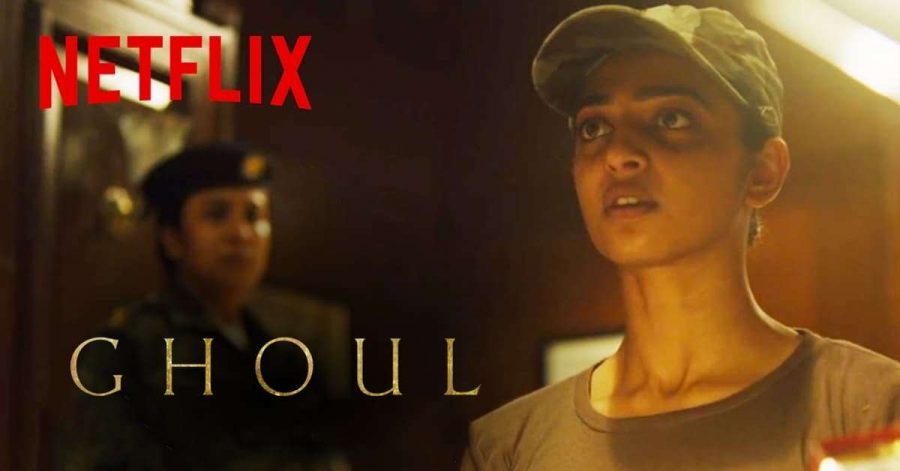*Spoilers ahead*
Director: Patrick Graham
Cast: Radhika Apte, Manav Kaul, Ratnabali Bhattacharjee, Mahesh Baleaj
Sometimes a work of art is best defined by the time it is made in. What elevates Ghoul, an imperfect horror-drama to a higher level, absolving it of its many cinematic flaws and turning it into the series you recommend to everyone around, is its timeliness. It tries to be the reflection of the Other India where activists and human rights lawyers are quietly picked up from their homes for vaguely defined crimes or sometimes without anything being told, by a government that also protects and empowers lynch mobs and forces the murder of the innocent in the name of caste, gender and religion.
Ghoul’s atmosphere encompasses not just the space within the film, but also the reality around it. There is plenty of gore. Towards the tail end, the film moves to a different terrain, of supernatural horror. But what is terrifying is the way the state renders the civilians powerless, without an independent voice or view. More terrifying are human beings who are capable of the worst of evils. The hell, according to Ghoul, is right here.
The film is set in a dystopian period when the Indian government is clamping down on dissenting voices, segregating and terrorising its Muslim population. When Nida Rahim (Radhika Apte), an upright intelligence officer, tips off the government forces on her own father, a college lecturer who teaches his students ‘out of syllabus’ material on human rights and freedom, she ardently believes that she has reached the pinnacle of loyalty and patriotism. However, she has to prove her loyalty everyday; convince ever-suspicious colleagues and higher authorities on a routine basis that she would never side with ‘her people’ and betray her country.
A perplexing turn of events begins when the most wanted terrorist, Saeed, is brought to a secret interrogation center – Meghdoot – where Nida is posted. The officers are proud of themselves at first, for having him under arrest. Soon the elation turns into confusion and finally, they are alarmed at the danger they are in. The guest is an evil form found in ancient Arabic texts – Ghoul – that taps into people’s guilt, turns it against them, and then kills them and eats their flesh. The prisoners and cops, including Nida, have to deal with a danger they have no control over, while also confronting their own guilty conscience.
There are several factors that pull the film down. It is a derivative film that offers no great surprises. It uses jump scares, monster faces and quite a few techniques that belong in the realm of B-Grade movies. For one, we see Saeed for the first time on a rainy night. A lighting strikes the sky in the background and there’s a close-up of his face. The sound design is slick, but predictable – it goes from signalling silence to loudness. The play-out of ‘Us vs Them’ is too in your face, especially in the final episode where the cops huddle and corner the ‘outsider’.
The film’s portrayal of the Muslim intelligentsia, particularly represented by Nida’s father, is tricky. He is the face of dissent in the beginning. He is witness to the violence and human rights violations propagated by the government that confiscates texts and properties of the Muslims, and burns even the rhyme books of children. However, in the final sequences, he becomes the alien element. From the state of an ordinary civilian to the victim, he turns into a virus that kills and infects. In the final sequences, the state-sponsored terror is a blur in the background, while the foreground is occupied by this pre-Islamic Arabian zombie.
The characters, more than a few times, behave as though they are in a theater play. Surprisingly, it works. For one, the soldiers welcome Faulad Singh, the most feared interrogation officer, by tapping on the iron bars with their lathi, and chanting – “He is coming!” In the beginning, Colonel Laxmi Das tells Nida that the most difficult part about Meghdoot is that it affects your body-cycle, and of course, your psychology. No one is really normal when they are inside this giant chamber that sprawls over like a maze, without access to sunlight or even the sight of sky. It is not hard to imagine something supernatural unfolding inside a space like this, which exists like a remote island.
Ghoul is also about bureaucracy and the military – how they change or break people who enter their system. Nida, like Sacred Games‘ Sartaj Singh, is an anomaly. She suffers from a lack of belonging, and possesses an ambiguous moral compass that guilt-trips her and then prods her to operate honestly in a system that is so corrupt. In both series, the good people jinx the equilibrium (of corruption and rot) in the bureaucracy.
Both actors, Apte and Saif Ali Khan, render powerful performances in their respective series, shaking up you as they get shaken up. Apte gets a few ‘heroic shots’, like the one where she grabs a rifle and walks ahead for the final fight. Particularly striking is the low-angle shot where she takes on the popular narrative that vindicates a soldier of any heinous crime for his status as a patriot. It isn’t quite the overbearing feminist statement as it was in Sacred Games, but something more subtle and enjoyable.
Recommended
Ghoul is no Get Out, Jordan Peele’s 2017 horror-drama that is subtle and brilliantly subversive. Like a teenager indulging in the new-found freedom of a college campus, the film fiddles with the possibilities that Netflix offers. It daringly tosses in politically contentious statements and instances which are, sometimes, very loud. It also tries to be an indie classic that talks in allegories, with an under-layer that discusses India’s current political situation. The blend is uneven.
*****
The Ghoul review is a Silverscreen original article. It was not paid for or commissioned by anyone associated with the movie. Silverscreen.in and its writers do not have any commercial relationship with movies that are reviewed on the site.



